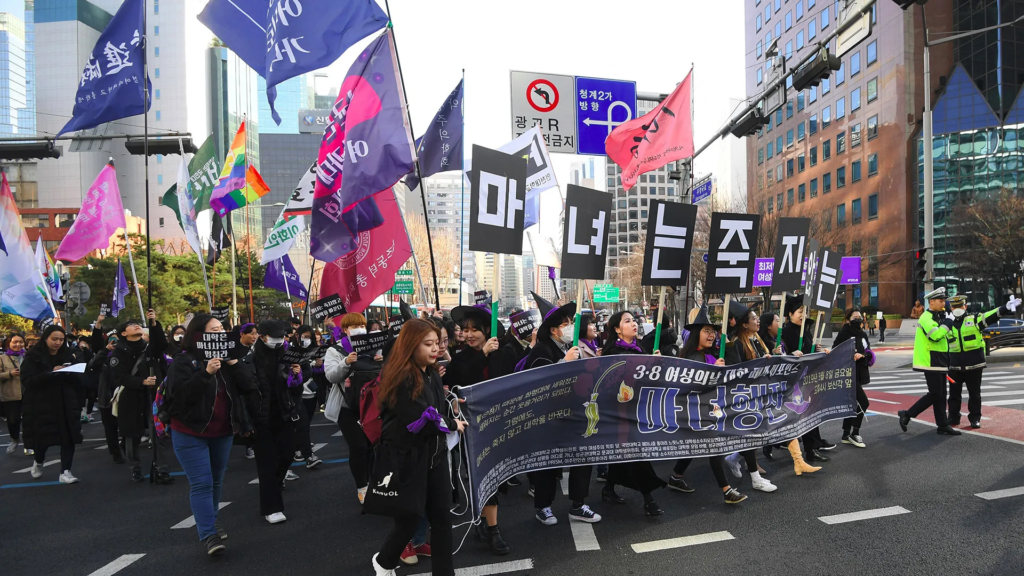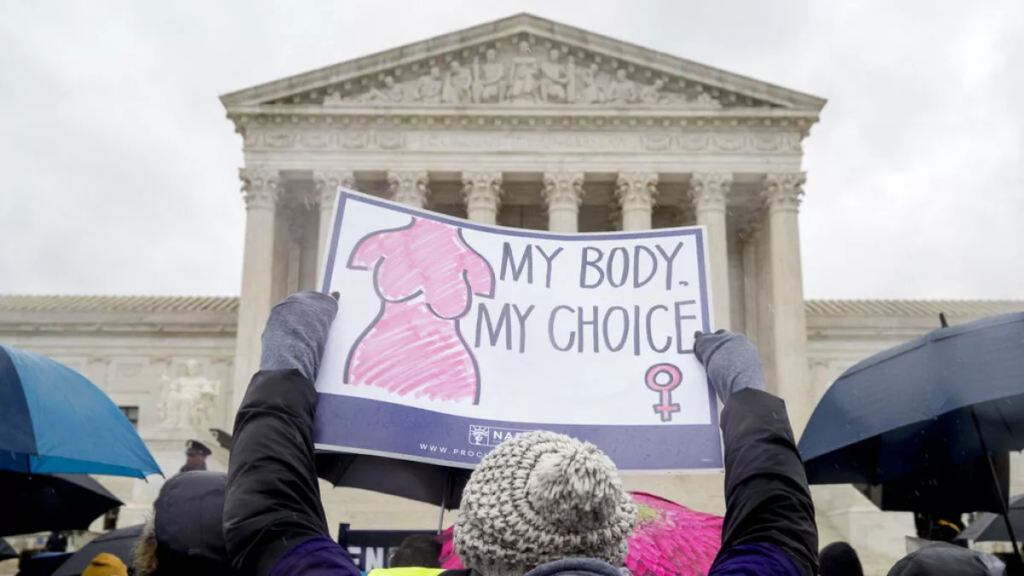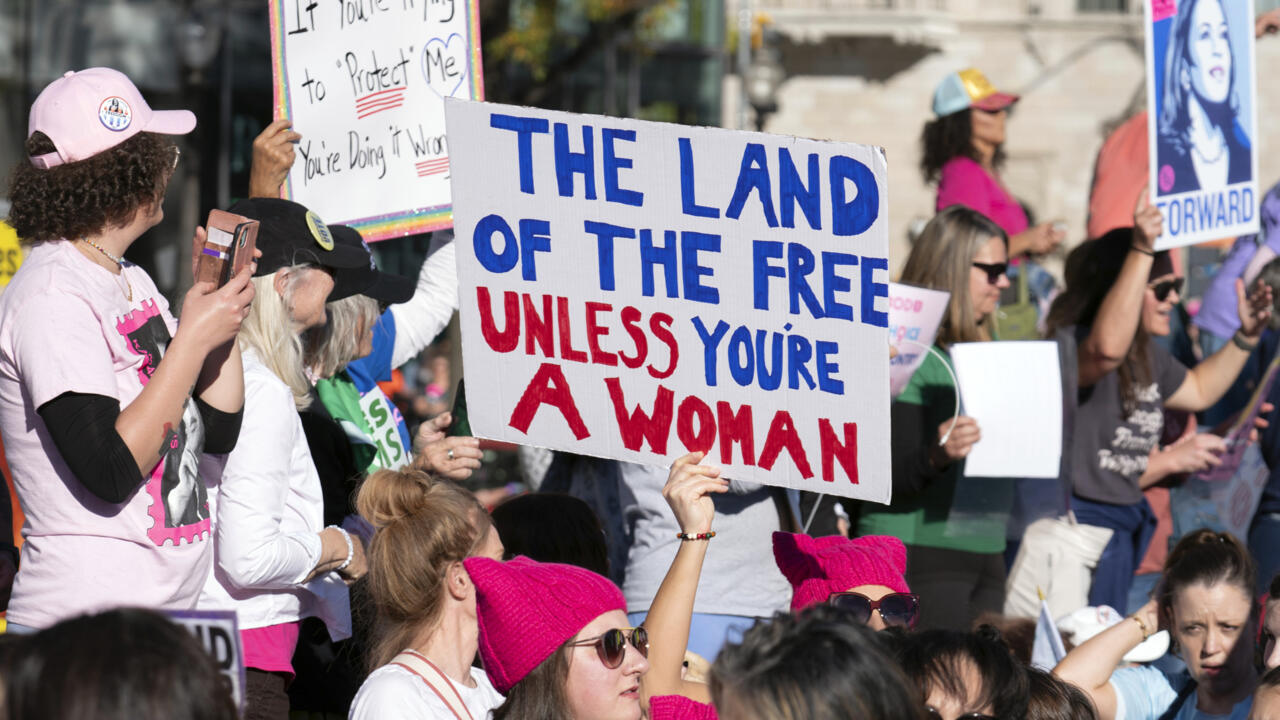As the US grapples with Donald Trump’s re-election, a growing number of young liberal women are finding solidarity in the South Korean 4B movement.
With roots in feminist resistance, the movement has sparked renewed interest as some American women look to distance themselves from male-dominated structures, partly in reaction to the voting patterns that helped secure Trump’s victory and the implications for women’s rights under his leadership.
The 4B Movement: A Feminist Response to Systemic Gender Inequality
The 4B movement — an acronym for four Korean terms meaning no marriage (bihon), no childbirth (bichulsan), no dating (biyeonae), and no sex with men (bisekseu) — emerged in South Korea around 2015. Responding to a backdrop of stark gender inequality, the movement became an emblem of resistance for young Korean women, especially after high-profile cases highlighted societal violence against women.
The 2016 murder of a young woman near a Seoul subway station, where the perpetrator allegedly confessed to his hatred of women, was a tragic turning point that galvanized conversations around misogyny, femicide, and digital sex crimes in Korea.
As women took to the streets and digital platforms, the 4B movement found traction among those who felt the need to reclaim control of their lives by refusing societal norms centered around men.
Read : Watch Viral Video of Donald Trump Dancing During Rally in Georgia
Driven by a desire to live independently and unshackled by expectations that often limit their agency, young South Korean women started to consider life alternatives that did not hinge on conventional roles within marriage and motherhood.
This movement, while not universally embraced, has resonated deeply with those who feel marginalized and wish to break away from traditional norms.
fuck america. every america woman should do the 4b movement pic.twitter.com/Y886gHjAme
— rypo ✿ ⚠️‼️ARCANE SEASON 2 SPOILERS‼️⚠️ mute me‼️ (@rypocore) November 7, 2024
In recent years, these sentiments have crossed borders, sparking curiosity and engagement among young women in other countries who, like many in South Korea, feel constrained by societal gender norms. This renewed interest in the 4B movement is spreading to the US, where some women now feel a kinship with the movement’s principles.
American Women Turn to 4B After Trump’s Victory
Donald Trump’s return to the White House has sent ripples of concern through many communities, especially among women. His stance on women’s rights and the accusations against him of sexual misconduct have long been focal points of public criticism.
When Trump was initially found liable in a civil suit brought by author E. Jean Carroll, many saw it as confirmation of his history of abuse allegations. Despite this, his re-election has led some women to reconsider their engagement with male-dominated institutions, a sentiment that aligns with the 4B movement’s core tenets.
In the wake of Trump’s re-election, the interest in the 4B movement in the US has surged, with young women discussing it on platforms like TikTok and Instagram. Many express frustration over male voting patterns, especially the apparent willingness of a significant number of men to overlook Trump’s controversial history regarding women’s rights.
The overturning of Roe v. Wade, which saw Trump-appointed Supreme Court justices leading to the elimination of national abortion rights protections, was a tipping point for many women who feel increasingly vulnerable under his presidency. They argue that it’s not only about their rights being systematically dismantled but also about the deeper frustration with male complicity in these outcomes.

Some American women are now pledging to distance themselves from men in their personal lives, choosing to abstain from dating, marrying, or having children with them, much like their South Korean counterparts. For many, it’s not about hatred but rather a form of self-protection and self-prioritization.
“Women are choosing themselves in droves,” says Ashli Pollard, a 36-year-old from St. Louis, who has vowed not to date or engage romantically with men. Pollard, like others, feels this is a way to regain autonomy and control over her own life.
The Wider Impact and Reception of the 4B Movement in America
The appeal of the 4B movement lies in its emphasis on women’s autonomy and self-empowerment. By rejecting the norms that pressure women to center their lives around men, adherents of the movement argue that they are taking a stand against patriarchy.
Some women, already dissatisfied with the status quo, find strength and comfort in the movement’s message of solidarity. Others see it as a protest against the growing societal challenges facing women, especially in a political climate that they feel increasingly marginalizes their rights.
However, the 4B movement in the US has received mixed reactions. Critics argue that the movement is too exclusionary and places a disproportionate focus on disengagement from men rather than addressing systemic issues.
Gender studies experts, like Ju Hui Judy Han of UCLA, suggest that while the movement resonates with many, it may struggle to gain widespread traction in the US, partly because of its roots in Korean society and the specific gender dynamics there.
In South Korea, high-profile incidents and stark gender inequality catalyzed 4B’s rise. However, for some American women, such a movement could inadvertently deepen divisions without addressing underlying causes.
Additionally, while many women express understanding of the movement’s principles, there is skepticism about whether it will translate to meaningful change. Critics argue that simply disengaging from men may not tackle the structural inequalities that make women feel vulnerable in the first place. They believe that addressing systemic patriarchy requires collaborative reform rather than opting out of relationships with men altogether.

Meanwhile, those joining or sympathizing with 4B see it as a powerful tool for personal liberation. For them, it’s less about exclusion and more about self-care, drawing boundaries, and ensuring they are not complicit in systems that they believe perpetuate harm. Some women say that while they may not adopt the movement’s principles wholesale, they are inspired to re-evaluate their relationships and roles in society.
Can the 4B Movement Bring Change in the US?
The popularity of the 4B movement in the US may wane as other initiatives come to the forefront, yet its influence on the conversation around gender inequality is undeniable.
Even if American women do not fully embrace its tenets, the growing discourse around it may prompt more to question their relationship to societal expectations. Women who feel inspired by 4B often cite it as a way to prioritize their own well-being, which may be a necessary first step towards addressing broader issues.
For instance, the interest in 4B has led some women to consider alternative ways to protest male-dominated systems, including financial and social boycotts of male-owned businesses or choosing to withhold emotional labor.
Others feel empowered to support policies and initiatives that work toward gender equity, hoping to create long-term change within the structures that shape society.
As the movement gains attention in the US, some believe it will also foster a sense of global solidarity among women. With many American women looking to their South Korean counterparts as an example, there is a growing recognition that the struggle for gender equality transcends borders.
Ultimately, while 4B may not become a mass movement in the US, its impact could be felt in subtle shifts toward gender consciousness, solidarity, and self-determination.
The 4B movement is a reminder that when political events threaten the rights and safety of women, some may choose paths of resistance that align with their own values. Whether it takes the form of a full-fledged movement or individual decisions to resist conventional roles, the impact of this re-evaluation could inspire deeper changes in gender dynamics and societal expectations.

